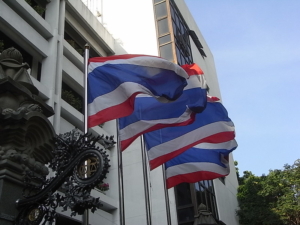Clinton Foundation Aids Myanmar and Thailand Earthquake Victims
 On March 28, 2025, a 7.7 magnitude earthquake struck Myanmar, with tremors felt across neighboring Thailand. The disaster caused more than 2,000 deaths, according to the Associated Press and led to severe destruction in Mandalay, Myanmar’s second-largest city. Damage to roads, airports and buildings complicated rescue and relief operations. Power outages, fuel shortages and high temperatures further slowed search efforts.
On March 28, 2025, a 7.7 magnitude earthquake struck Myanmar, with tremors felt across neighboring Thailand. The disaster caused more than 2,000 deaths, according to the Associated Press and led to severe destruction in Mandalay, Myanmar’s second-largest city. Damage to roads, airports and buildings complicated rescue and relief operations. Power outages, fuel shortages and high temperatures further slowed search efforts.
Seismic Risk and Regional Vulnerability
Experts attribute the quake to tectonic activity along the Sagaing Fault, a major boundary between the India and Eurasia plates that cuts through densely populated areas like Mandalay. According to geologist Dr. Rebecca Bell of Imperial College London, the fault’s linear structure allows for wide ruptures, contributing to the scale of destruction.
Impact on an Ongoing Humanitarian Crisis
The earthquake added pressure to Myanmar’s existing humanitarian emergency. Since 2023, escalating conflict has led to widespread displacement and many of those affected by the earthquake were already living in fragile conditions. The disaster intensified the need for shelter, clean water, food and health care. According to Health Poverty Action, thousands of people have been injured or displaced, while hospitals face critical supply shortages. The International Rescue Committee (IRC) reported urgent needs for tents, medical services and clean drinking water
Economic Toll
The quake caused an estimated $36 billion in damage, roughly 70% of Myanmar’s GDP. This widespread destruction further weakens a national economy already strained by conflict and poverty. Beyond the immediate destruction, the earthquake severely disrupted Myanmar’s agricultural sector, particularly in the Dry Zone, which is the country’s primary region for pulses, oilseeds and cereals.
Damage to infrastructure, such as roads and bridges, has hindered farmers’ access to markets and essential inputs, threatening upcoming planting seasons and potentially leading to reduced harvests and incomes. Furthermore, the destruction of key government facilities in Naypyidaw, including ministries responsible for trade and commerce, has impeded administrative functions critical for economic recovery and export activities. These compounded effects are expected to exacerbate inflation, increase poverty rates and strain Myanmar’s limited foreign exchange reserves, posing long-term challenges to the nation’s economic stability.
Coordinated Aid Through the Clinton Global Initiative
The Clinton Foundation’s Clinton Global Initiative (CGI) quickly mobilized its members to respond to the crisis. These partners worked alongside local and international groups to support communities affected by the disaster.
- The Afya Foundation assessed medical needs and distributed supplies through local partners.
- Airlink coordinated logistics with more than 15 NGOs, helping deliver search and rescue teams despite damaged infrastructure.
- All Hands and Hearts arrived shortly after the quake to assess needs and provide an early response in Bangkok and nearby communities.
- CARE delivered urgent medical and health services for women and families.
- The Center for Disaster Philanthropy (CDP) supported recovery efforts with targeted funding.
- Direct Relief, with a longstanding presence in the region, coordinated with the ASEAN Coordinating Center to deliver emergency medical aid.
- The International Medical Corps provided emergency trauma and surgical care, deploying a medical team to assist overwhelmed hospitals and clinics.
Looking Ahead
As relief efforts continue to aid those affected by the earthquake in Thailand and Myanmar, international organizations and local partners remain focused on recovery, emphasizing the importance of collaboration during disasters. The coordinated response through the Clinton Foundation’s network reflects the growing role of philanthropic and nonprofit actors in delivering rapid humanitarian assistance, especially in regions already experiencing poverty and instability.
– Abirame Shanthakumar
Abirame is based in Ontario, Canada and focuses on Celebs and World News for The Borgen Project.
Photo: Flickr
